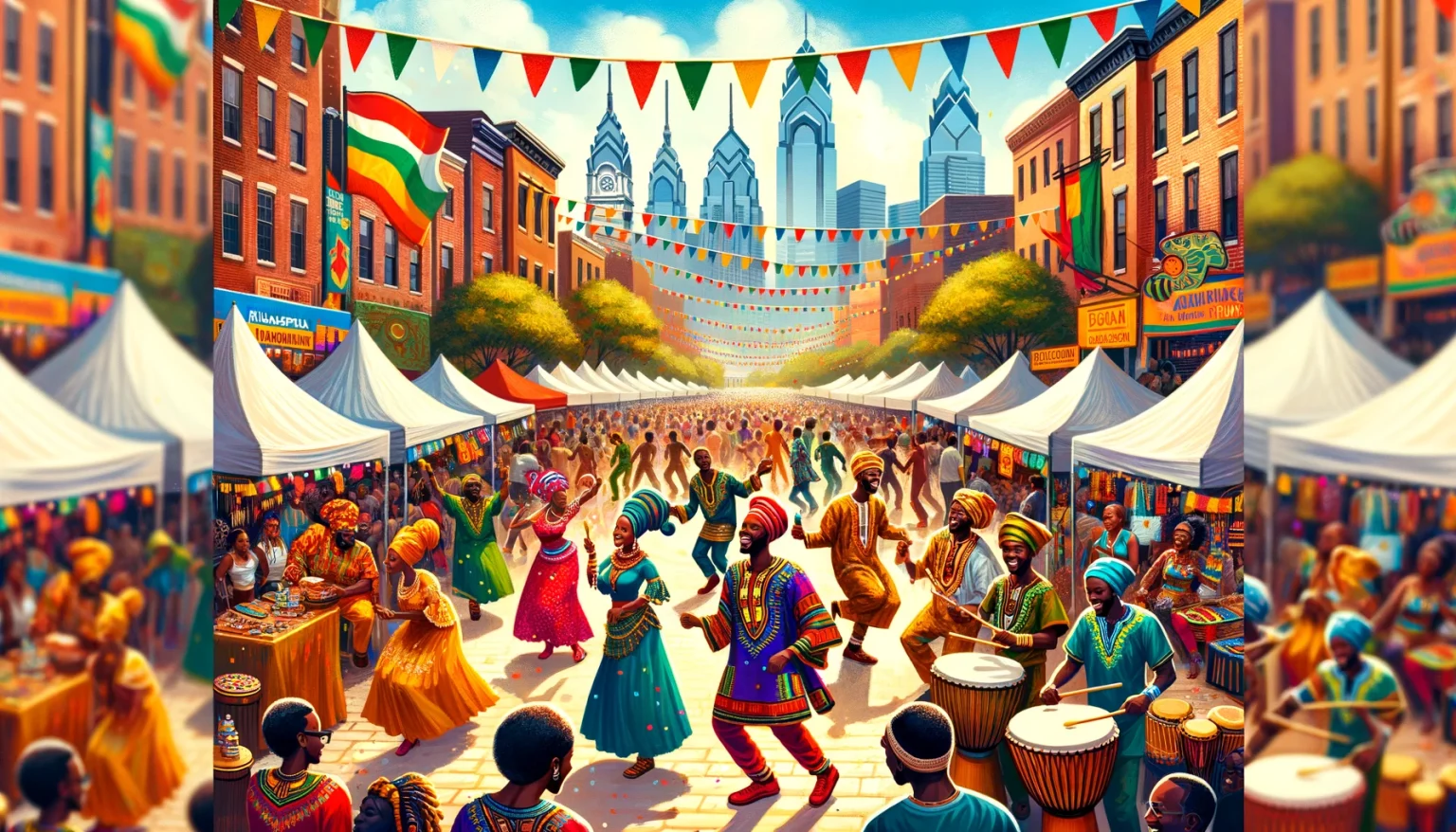The Odunde Festival is a vibrant annual celebration that brings the richness of African culture to the streets of Philadelphia. Founded in 1975, this festival has become a cornerstone for African-American heritage, drawing hundreds of thousands of attendees each year. In this article, I will delve into the history, cultural significance, and modern-day celebrations of the Odunde Festival, highlighting its impact on the community and beyond.
Historical Background: From Yoruba Roots to Philadelphia Streets
The Odunde Festival has its origins deeply rooted in the Yoruba culture of Nigeria. The word “Odunde” means “Happy New Year” in the Yoruba language, and the festival traditionally marks the Yoruba New Year. It was brought to life in Philadelphia by Lois Fernandez, a visionary who wanted to preserve and celebrate African heritage in her community. Since its inception, the festival has grown exponentially, transforming into the largest African-American street festival in the United States.
Lois Fernandez’s inspiration for the festival came from her travels to Nigeria, where she experienced the profound spiritual and cultural practices of the Yoruba people. Upon her return, she sought to create an event that would resonate with African-Americans and help bridge the gap between their ancestral roots and contemporary lives. Over the years, the festival has evolved, incorporating diverse elements while staying true to its Yoruba origins.
Cultural Significance: A Tapestry of Yoruba Traditions and African-American Pride
The Odunde Festival is more than just a celebration; it is a powerful expression of Yoruba traditions and their significance within the African-American community. Central to the festival is the offering of fruits and flowers to Oshun, the Yoruba river goddess. This ritual underscores the spiritual connection and reverence for the deities of the Yoruba pantheon, symbolizing renewal, fertility, and blessings.
The festival also serves as a platform for cultural pride and community cohesion. It brings together people from all walks of life, fostering a sense of unity and shared heritage. For many African-Americans, the Odunde Festival is a poignant reminder of their roots and an opportunity to reconnect with their cultural identity. It is a space where history, spirituality, and contemporary expression converge, creating a rich tapestry of tradition and modernity.
Festival Activities: A Feast for the Senses
One of the most enchanting aspects of the Odunde Festival is its vibrant array of activities. The festival kicks off with a lively parade and processions, featuring participants adorned in colorful African attire. These processions are not only visually stunning but also spiritually significant, as they often include traditional rituals and blessings.
Music and dance are integral to the festival’s allure. Attendees can enjoy performances by traditional African drummers, dancers, and contemporary artists, creating an infectious rhythm that resonates through the streets. The festival’s marketplace is another highlight, where vendors offer a diverse range of African, Caribbean, and African-American merchandise, from clothing and jewelry to art and culinary delights. Workshops and educational programs are also a staple, providing insights into African traditions, crafts, and history.
Modern-Day Celebrations: A Global Attraction
Today, the Odunde Festival is an eagerly anticipated event, drawing visitors from across the globe. Held annually in June, it transforms South Street in Philadelphia into a bustling hub of cultural celebration. The festival’s ability to attract over 500,000 attendees each year is a testament to its enduring appeal and significance.
In recent years, the festival has also embraced virtual elements, expanding its reach and accessibility. This adaptation was particularly significant during the pandemic, allowing the festival to continue its mission of cultural preservation and celebration even in challenging times. The fusion of in-person and virtual experiences ensures that the Odunde Festival remains relevant and inclusive, welcoming participants from all corners of the world.
Impact and Legacy: Preserving Culture and Fostering Community
The Odunde Festival plays a crucial role in preserving and promoting African culture and heritage. It is a vibrant reminder of the strength and resilience of African traditions and their profound impact on the African-American community. By celebrating these traditions, the festival helps keep them alive for future generations, fostering a deep sense of cultural pride and continuity.
Economically, the festival brings significant benefits to the local community. It boosts local businesses, attracts tourism, and creates opportunities for vendors and artists. Beyond its economic impact, the festival’s influence extends globally, inspiring similar events and garnering recognition for its cultural significance. The Odunde Festival is not just an event; it is a legacy of cultural celebration and community spirit.
Conclusion: Reflecting on the Odunde Festival’s Impact
The Odunde Festival is a shining example of how cultural traditions can be preserved, celebrated, and adapted for contemporary audiences. Its rich history, cultural significance, and vibrant activities make it a unique and essential event for the African-American community and beyond. Personally, attending the Odunde Festival has been a profoundly moving experience, a journey into the heart of African heritage and a testament to the power of community and cultural pride.
10 Interesting Facts About the Odunde Festival
- Largest African-American Street Festival: The Odunde Festival is the largest African-American street festival in the United States, attracting over 500,000 attendees each year.
- Yoruba New Year Celebration: The name “Odunde” means “Happy New Year” in the Yoruba language, and the festival marks the Yoruba New Year, reflecting its deep roots in Yoruba culture.
- Founding Year and Founder: The festival was founded in 1975 by Lois Fernandez in Philadelphia, inspired by her travels to Nigeria and her desire to celebrate African heritage.
- Spiritual Significance: Central to the festival is the offering of fruits and flowers to Oshun, the Yoruba river goddess, symbolizing renewal, fertility, and blessings.
- Cultural Marketplace: The festival features a vibrant marketplace with vendors selling African, Caribbean, and African-American merchandise, including clothing, jewelry, art, and food.
- International Recognition: The Odunde Festival has gained international recognition and inspired similar cultural festivals worldwide, celebrating African heritage and traditions.
- Educational Programs: Alongside entertainment, the festival offers workshops, educational programs, and lectures that provide insights into African traditions, crafts, and history.
- Economic Impact: The festival brings significant economic benefits to Philadelphia, boosting local businesses, attracting tourism, and creating opportunities for vendors and artists.
- Diverse Performances: Music and dance are integral to the festival, featuring traditional African drummers and dancers, as well as contemporary artists, creating a dynamic and engaging atmosphere.
- Community Spirit: The Odunde Festival fosters a sense of unity and cultural pride, bringing together people from diverse backgrounds to celebrate African-American heritage and community spirit
The Odunde Festival is more than just a cultural event; it is a testament to the resilience and richness of African traditions and their profound influence on the African-American community.
#OdundeFestival #YorubaCulture #AfricanHeritage #CulturalFestivals #PhiladelphiaEvents #AfricanDance #CommunitySpirit #Oshun #CulturalCelebration












A wonderful celebration of African heritage at the Odunde Festival. Truly inspiring!
Important heritage!
Celebrating the Odunde Festival is beautifully covered. This article highlights the rich African heritage celebrated at the festival.
The Odunde Festival is a vibrant celebration. This piece captures the essence and significance of African heritage well. Thanks for sharing!